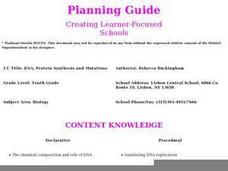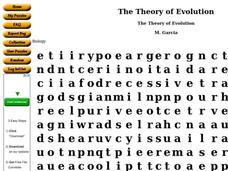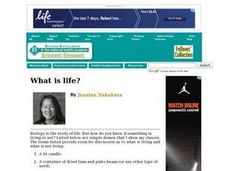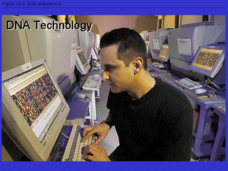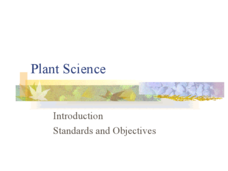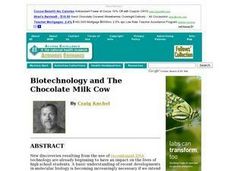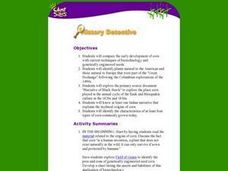Agriculture in the Classroom
A Rafter of Turkeys
How did that turkey get from the early Aztec culture to your table? Learn about the history of wild and domesticated turkeys in North America, as well as their inclusion in Thanksgiving traditions, with a two-part agricultural science...
Curated OER
Cotton and Cabbage
High schoolers note how given traits could be achieved by selective breeding and by transgenesis. They identify different uses of GEO. Students recognize that the use of letters (Bt) before an organism's name means that the organism has...
Curated OER
DNA, Protein Synthesis and Mutations
Tenth graders investigate the chemical composition of DNA and RNA and how they work together to synthesize protein. They discover genetic codes, gene chromosome theory, and how the environment influences our appearance.
Curated OER
Science: Designer genes
Students engineer new organisms using biotechnology. In small groups, they write procedures, list benefits and drawbacks, and explain how their new organism might affect the environment. After creating their new organisms, they present...
Curated OER
The Theory of Evolution
In this biology worksheet, students identify and locate various vocabulary terms pertaining to the Theory of Evolution. There are 30 biology terms related to evolution located in the word search.
Chicago Botanic Garden
Calculating Your Carbon Footprint
Unplugging from technology for one day per week will decrease your carbon footprint—are you up to the challenge? Part two in a series of three allows individuals to explore their personal carbon footprints. By first taking a quiz at home...
Chicago Botanic Garden
Calculating Your Ecological Footprint
You can lower your ecological footprint by recycling! Lesson four in this series of five has individuals, through the use of a computer, calculate their ecological footprints. Through discussions and analysis they determine how many...
Oregon Museum of Science and Industry (OMSI)
DNA Extraction
What does your DNA actually look like? Use simple materials with this experiment to find out! Geneticists of all ages can follow these instructions to extract their own DNA. For learners who are hoping to extend the activity, there are...
Curated OER
What is Life? Demonstrations & Discussion
Display seven items for your biologists to consider. Are they living or non-living? How can you tell? This is a simple outline of what you can display and questions that can be discussed as this topic is explored. One way to use this...
Curated OER
DNA Technologies
After giving some of the basic characteristics of the DNA molecule, the slides provide process information and many detailed diagrams about plasmids, vectors, and their application in cloning genes.
Curated OER
Plant Science Introduction
A unique PowerPoint explains the basics of plant science. It motivates viewers to study plant science and then lists different food products, biofuels, fibers, timber, and ornamental uses of plants. It concludes with lists of careers...
Curated OER
I Feel Renewed!
Students participate in a simulation of the equal and unequal distribution of the earth's renewable resources. They discuss renewable resources and how food resources can increase and decrease, participate in the simulation, and analyze...
Curated OER
Heredity Mix 'n Match
Students randomly select jelly beans that represent genes for several human traits such as tongue-rolling ability and eye color. Then, working in pairs (preferably of mixed gender), students randomly choose new pairs of jelly beans from...
Curated OER
Biotechnology and The Chocolate Milk Cow
Students discuss new discoveries that have resulted from the use of recombinant DNA technology and otehr biotechnology. In groups, they create a transgenic cow capable of producing chocolate-flavored milk.
Curated OER
History Detective
Middle schoolers study the effects of the Great Exchange on the Americas.
Curated OER
The Challenge to Deliver Insulin
Students study the types of diabetes and why insulin is important. For this diabetes lesson students build molecular models and create a healthy lifestyle plan.
Curated OER
Freshwater Sharks Bite Children at 35th Beach. A Play
Students delve into a study of sharks. In this science lesson plan, students examine the many different scientific occupations, as well as some possible specializations therein, and perhaps a little bit of other life considerations,...
Curated OER
Writing a Political Leader
Students investigate politics by writing a formal letter. In this U.S. Government lesson, students discuss political issues they would like to address and research their topic using the Internet. Students locate an appropriate political...
Curated OER
The Perfect Cow?
High schoolers examine how cattle have evolved through natural selection and selective breeding. In this natural selection lesson students compare and contrast natural and artificial selection.
Curated OER
"The Giver"- A Novel Study
Here are some resources and lesson ideas to incorporate into a literature study of the novel "The Giver" by Lois Lowry.
Curated OER
Introductions to Biotechnology
Although this PowerPoint has valid information, the 49 slides may not engage your students as much as necessary. Each slide has a title and 2 or 3 bullet points, but no images or external resource links to break up the information. ...
Serendip
Is Yeast Alive?
Through two investigations, life science learners determine whether or not yeast is alive. They perform tests for metabolism by providing sugar and observing if gas is produced as a byproduct. They incubate some of the sample for at...
Teach Engineering
Corn for Fuel?!
Can corn power the world? Young scientists learn about how corn and other plants can provide renewable biofuels in the second of nine lessons. They set up an experiment to investigate how different variables affect plant growth. All of...
Howard Hughes Medical Institute
Natural Selection and the Evolution of Darwin's Finches
Darwin explained the connection between species of finches 150 years before scientists understood DNA. Technology and progressing science proved he was right, yet many struggle to understand how natural selection happens. Scholars use...
Other popular searches
- Cloning Genetic Engineering
- Genetic Engineering Debate
- Genetic Engineering Religion
- Genetic Engineering in Food
- Genetic Engineering of Food
- Biology/ Genetic Engineering
- Genetic Engineering Ethics
- Human Genetic Engineering
- Genetic Engineering in Hmans
- Genetic Engineering Graphics
- Genetic Engineering in Hm Ans
- Genetic Engineering Plasmid




